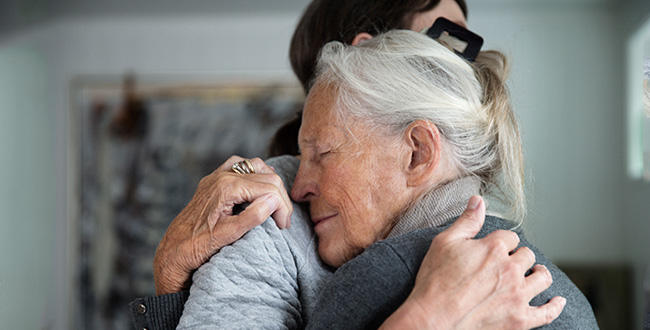
Author Name: Elizabeth Jenkins
Publish Date: March 25, 2015
Website Link: http://www.prevention.com/health/supporting-someone-terminal-illness
When you’re the family member or friend of someone who receives a terminal diagnosis, life as you know it can change overnight. We asked people who have been through it themselves—sometimes on multiple occasions—to share their advice for navigating these difficult times.
1. Try to live as normally as possible
If you have some time with your loved one, spend it wisely. Carole Brody Fleet, author of Widows Wear Stilettos, says that when her husband was diagnosed, “our focus was on living with ALS, not dying from it. We continued family gatherings, went out to dinner, and did as much as we were able to. Even when Mike could no longer ride his horses, his friends would take him (wheelchair and all) to the stables so that he could at least enjoy them.” When Diana Ketterman was a teenager, her father was diagnosed with a brain tumor and she found that simple activities were sometimes the best. “Catching lightning bugs and going fishing together seemed to make my dad happy,” she recalls.
MORE: Living Each Day With Gratitude
2. Spread the word appropriately
“Remember that this is their diagnosis and you need to respect their wishes,” says Staci Torgeson, whose mom has Stage IV lung cancer. “Some people are very private, while others want everything up on a billboard.” Julie Lavin, a mental wellness and life coach, adds that you should ask who the patient wants you to tell, how he wants you to spread the news, and what information should be included or excluded. Brody Fleet says, “Regardless of your relationship to the patient, you must always ask permission before spreading the word, particularly on social media. They may be bombarded and overwhelmed with well-wishers—all with good intentions—but it can be a lot to absorb.”
3. Ask questions
“Don’t try to be a mind reader,” says Liz O’Donnell, whose mother died of ovarian cancer and whose father is battling Alzheimer’s. “Ask your loved one how they want to live for the rest of their life. Ask them, if they seem willing to discuss it, how they want to die. Ask them what they’re worried about,” she says. “They may want help with paperwork, finances, reaching out to people, resolving past hurts, or talking to a clergy person. They may be worried about treatments or pain management.”
4. Don’t impose your opinion.
Everyone will react to their diagnosis differently, so it’s essential to respect their wishes and not foist your own feelings upon them. Laura Sobiech, who lost her son Zach to osteosarcoma, says, “Any question or statement that starts with ‘have you tried,’ ‘you should try’ or ‘you should go,’ was not helpful. Too often people wanted to make themselves feel better by giving us ‘advice’ on how to deal with Zach’s illness.” Michelle Monroe Morton, whose best friend has been battling brain cancer for four years, says, “Don’t tell them they should or shouldn’t feel a certain way. Just acknowledge what they are saying to you.”
5. Really listen
Emily Kaplowitz, who works for The Fixler Foundation, an organization dedicated to supporting people faced with a life-threatening illness, stresses the importance of being an active listener. “Nod your head, make eye contact and smile,” she says. “Listening is about the other person, not about what you are going to say next.” Julie Loven, who cared for her grandfather after he was diagnosed with prostate cancer, says, “Allow your loved one to talk—endlessly if they want to. Remember that these are the last conversations you will have. Focus on the inflections of their speech and the funny stories they tell. This is what you’ll want to remember.” On the other hand, says O’Donnell, remember that the patient may want to sit in silence. “Let him set the pace of the conversation,” she says.
6. Laugh often
 ( Photograph by Daly and Newton/Getty Images )
( Photograph by Daly and Newton/Getty Images )“Buy funny books. Read funny stories,” says Loven. “I took my grandfather to see the movie Dodgeball and he laughed so hard his chest shook. That’s a memory I will treasure forever.” Andrea Pauls Backman recalls one Thanksgiving when her mother, who was battling ALS, forgot her syringe for her feeding tube. “We used a clean turkey baster instead, and all had a good laugh about basting Mom for Thanksgiving.” Allen Klein, who wrote the book Learning to Laugh When You Feel Like Crying, based on his own experience after his wife’s passing, says, “Don’t necessarily force humor on a situation, but if something funny arises, laugh at it. Often, friends and family got so serious that they dragged me down even deeper than I already was.” And Mary Lee Robinson, author of The Widow or Widower Next Door, adds, “To think that you must be somber and gloomy every minute of the journey is to deny yourself some wonderful, warm, and loving memories.”
7. Provide real support
Kaplowitz, who has lost her mother and two friends, says the key to lending a hand is to be specific. “For example, say, ‘I’m free Thursday afternoon for three hours.’ It was not helpful, however, when people put the burden on us to figure it out and coordinate.” Kelly Harvey, MS, PT, CHHC, who lost both parents to cancer, says the best help is practical: “Fill the fridge, watch the kids, clean the house, walk the dogs, and run the errands. These things are profoundly more effective than a pity party.” Brody Fleet remembers when a family at her synagogue invited her daughter over for the weekend. “It gave her a break from her sad reality and just let her be a kid—something that goes by the wayside when there’s a terminal illness in the family.”
8. Discuss logistical matters
If a loved one only has a short time left to live, do what you can to help them get their affairs in order. But if the opposite is true, don’t rush the conversation. “Don’t immediately talk about funeral arrangements if they have two years to live, but don’t wait until their illness progresses so far along that they can’t be part of the decisions,” says Lavin. Harvey advises letting the patient dictate the amount of future planning—such as wills and estate matters—they are willing to discuss or able to tolerate: “Keep it all in a folder, with an agenda sheet in front, to allow the patient to review the documents at their comfort, if possible.” For example, Mallory Moss, NP, says knowing that her mother wanted to be cremated, rather than buried, was a relief, and advises others to encourage their loved ones to communicate their wishes.
9. Don’t encourage false hope
Brody Fleet stresses the importance of not downplaying the situation or creating false hope. “When you deny a terminal patient’s reality, you’re also denying them of the very real need to talk about what’s happening to them,” she says. Robinson, who lost her husband after a long battle with a circulatory disease, says you have to face reality. “Pretending that death isn’t coming to each of us is pretty foolhardy, and only makes it harder on loved ones who survive us. I am glad we talked about it; it made my decisions that much easier to bear.”
10. Create a wish list
 ( Photograph by Gianni Diliberto/Getty Images )
( Photograph by Gianni Diliberto/Getty Images )Once the patient has accepted his diagnosis, Lavin suggests offering to help him make a wish list. “Tell them, ‘When and if you are ready, I’d love to help you come up with a list of things you’d like to do before you go. Who would you like to be with you when you do them?” Jan Berlin, PhD, who lost his wife to brain cancer and founded Heart to Heart, a caregiver support program at the Tower Cancer Research Foundation in Beverly Hills, learned that “living life to its fullest” means something different for everyone. “It may mean creating lots of social interaction, or deep conversations with only one or two close friends, or immersion in art, or time in nature,” he says.
11. Divide up the responsibilities
“Every family member isn’t cut out for every job,” says Tracee Dunblazier, who has lost her mother, father, and stepfather. “In my family, I was the spiritualist who helped my mom talk about death and afterlife, one of my sisters was the medical advocate, and my other sister took care of bills and other financial arrangements.” O’Donnell suggests keeping a list of things you need help with. “Then the next time someone asks how they can help, give them a task from the list.” Khrystal Davis, whose son Hunter is battling Spinal Muscular Atrophy Type 1, recommends enlisting the help of others to spread the word. She posts updates on a Facebook page she created, but says someone at your kids’ school or your office can get the message out to their respective communities. “You don’t want to spend your valuable time telling people the same thing over and over,” she says. Wendy Marantz Levine, who lost her sister to a degenerative neuromuscular disease, says, “When people expect calls back or constant updates, it can be overwhelming. You need to focus on the person who is sick and their immediate family, not be taking care of everyone else,” she says.
12. Touch them if they’re open to it
 ( Photograph by Portra Images/Getty Images )
( Photograph by Portra Images/Getty Images )“Often people don’t want to touch those who look ill, but patients crave human contact,” says VJ Sleight, who has battled cancer twice herself and is a hospice volunteer. She advises visitors to ask the patient if they can hold his hand or lightly rub his back. Cathy Jones also found that wetting her mother’s dry lips and tongue, stroking her hair, and simply talking to her was worthwhile, even after her mom had become comatose. “They may not be able to see you but they may hear you, and those sensations let them know that someone who loves them is right there,” she says. Likewise, Natasha Tronstein recalls of one visit to the hospital, “I used baby wipe to give my father’s arms, legs and feet a cleansing of sorts, and massaged lotion into his limbs. He craved that touch,” she says. Harvey explains that skin-to-skin contact is incredibly healing because it “releases hormones and regulates the patient’s heart rate.”
13. Help them maintain their dignity
Berlin says, “Cancer can change the body, but the person is still there. Don’t make a big deal about what bodily functions may change as the illness progresses.” After Marantz Levine’s sister Melissa passed away, she co-founded Beauty Bus, a foundation that brings beauty treatments to ill patients. “Melissa said that getting beauty treatments while she was sick made her feel human again.” And Jones stresses the importance of treating the patient the same as before her sickness. “Don’t change their clothes, diapers or bedding with lots of people around. It’s degrading to act as though their privacy and dignity no longer matter.” She also adds that if the person is comatose in the final days, don’t have conversations about them as if they are not there. “Leave the room to have those talks,” she says. “Don’t do anything you wouldn’t do if they were coherent and part of the conversation.”
14. Don’t stay away
“I wish people hadn’t stayed away or avoided calling because they thought they were intruding,” says Tronstein, who lost her father to lung cancer just six weeks after he was diagnosed. “It’s so important to have support from all angles at times like these,” she says. Pauls Backman says, “Initially, the outpouring of support was wonderful, but as my mom’s disease progressed and got very ugly, some people got uncomfortable. Fewer and fewer people visited or called. I wish more had taken the time to write her, since she couldn’t communicate verbally.” Klein recalls, “There was a lot of support for me immediately after my wife died. But several months down the road is when the reality of the loss really settled in and I needed people the most. But friends and family, maybe thinking I was okay, went on with their lives and stopped their regular contact.”
15. Allow yourself to grieve before you attempt to heal
“The healing process is difficult and never ends,” says Loven, “but don’t ignore your feelings. Allow yourself to grieve the loss, to cry and be angry and work through the emotions.” Brody Fleet says, “Make time for grief. If you don’t, it will come back to bite you at some point.” Jodi O’Donnell-Ames, who lost her husband to ALS when he was 30, says, “Everyone heals at different times and in different ways. Be gentle with yourself and know that there is no ‘best’ way.”
Author Name








